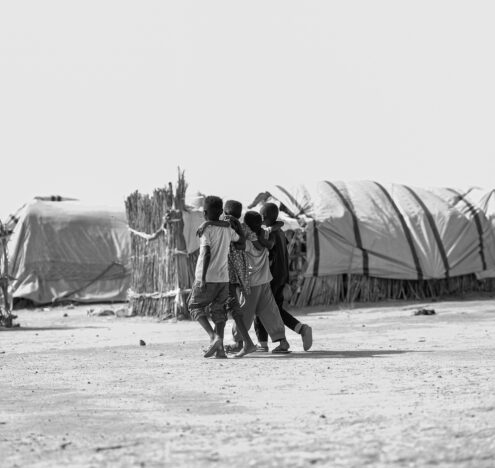In November, thousands of workers and students marched in Bogotá. They were protesting rising levels of violence — particularly in rural communities — as well as inadequate access to vital healthcare resources during the COVID-19 pandemic. This is just one of many such protests in the last few months demanding that the Colombian government do more to protect vulnerable communities and uphold the terms of the hard-fought 2016 peace deal signed with the Revolutionary Armed Forces of Colombia (FARC-EP).
The historic peace agreement promised to end 52 years of brutal conflict that left over 200,000 Colombians dead and millions displaced. Despite promises made during the peace agreement’s signing, mass killings and displacement of civilians have surged. In September, the UN documented a new wave of civilian massacres. At least 33 massacres occurred in the first eight months of 2020, compared to 11 in all of 2017. Narcotrafficking has also continued largely unabated.
The growing instability in Colombia should be setting off alarm bells in the United States. Aside from the moral imperative to end violence against civilians, supporting and strengthening peace serves US strategic interests for two key reasons. First, a further escalation of violence in Colombia could lead to a region-wide mass migration and humanitarian crisis that would further burden the US refugee and asylum-seeking process, which is already excruciatingly slow. Second, a failed peace in Colombia will expand narcotrafficking exponentially, further strengthening an already lucrative — and illicit — industry that armed groups have used to fuel decades of conflict in Colombia.
THE LOOMING MIGRATION CRISIS
While facing its own internal challenges, Colombia has become a place of refuge for over 1.8 million migrants fleeing Venezuela’s economic and political crisis. Unlike most other countries in the region, it has maintained a generous open-door policy to Venezuelan refugees. This policy acts as a regional buffer to the destabilizing impact of Venezuela’s collapse and reduces the number of Venezuelan migrants fleeing to Central America and the United States. It has also put further strains on Colombia’s struggling economy. According to the World Bank, Colombia’s economy is facing a projected 7.2% contraction in 2020 as a result of falling global commodity prices and a deep recession. Additionally, the costs of supporting incoming Venezuelan migrants continue to rise. In 2019 alone, funding for social programs for Venezuelan migrants and refugees cost Colombia more than $1.5 billion.
Similar to Colombia, cocaine addiction seems to be getting worse in the United States; a 2018 White House statement reported that the number of new users has increased by 81% since 2013, while overdose deaths involving cocaine have increased 110%.
If peace were to completely collapse in Colombia and violence were to break out on a large scale once more, not only would millions of Colombians be uprooted, but these recently-settled Venezuelan migrants would also be thrown into chaos. With nowhere else to go, millions of refugees would likely drive further migration crises in Central America as more people flee north to the United States. With its own internal conflicts surrounding immigration policy and a historically underfunded humanitarian capacity along its southern border, the United States is ill-prepared to handle this potential surge in refugees.
COCAINE PRODUCTION’S CONTINUED THREAT
As part of a strategy known as Plan Colombia, the United States spent over $10 billion in Colombia on counter-narcotics and security assistance between 2000 and 2016. This security assistance program armed and equipped Colombian government forces to pursue cartels and FARC-EP insurgents that have profited from the production and distribution of cocaine, and funded the insurgency. But this program failed to address the root causes of cocaine production — such as a lack of critical infrastructure in remote regions needed to bring perishable crops to legitimate markets — and did little to reduce it over the long term.
The 2016 peace accords sought to make the production of coca (the base ingredient for cocaine) less attractive by improving the rural market infrastructure and making the cultivation of legal crops (such as oranges, pineapple, and yuca) more economically viable. To do this, the peace accords created new public service financing instruments called the Territorially Focused Development Plans (PDETs). Through local participatory planning, these plans have the goal of improving public infrastructure, particularly in regions affected by decades of fighting, by mobilizing both public and private sector investment in roads, bridges, as well as education and health services. Sixteen PDET Action Plans for Regional Transformation (PATR) have been created thus far, but continued community-wide engagement is needed to fully and inclusively implement them. These plans will act as the overarching frameworks through which public services will be funded to enact crop substitution programs (thereby reducing coca production). They also carry the promise of building trust between the government and outlying communities who have historically been victims of the violence with the FARC-EP.
A return to full-scale fighting in Colombia would almost certainly result in a significant spike in cocaine production and end any progress made towards rural development. Drug addiction in Colombia has become more pronounced as a result of increased cocaine production, rising 38% from 2008 to 2013. Further spikes in cocaine production would primarily fund cartels and insurgents, further perpetuating the cycles of violence.
Cocaine production spikes would also carry significant ramifications for the United States and Western Europe, as most of the cocaine produced in Colombia eventually makes its way there. Similar to Colombia, cocaine addiction seems to be getting worse in the United States; a 2018 White House statement reported that the number of new users has increased by 81% since 2013, while overdose deaths involving cocaine have increased 110%. This year the crisis has been exacerbated by the COVID-19 pandemic, which has already led to an increase in opioid-related overdoses.
THE BROKEN PROMISES PLAGUING COLOMBIAN PEACE
The historic signing of the Colombia-FARC peace accord brought with it the promise of fundamentally transforming Colombia and setting an example for ending a long-term conflict successfully. Broken promises over the last four years, however, pose an existential threat to prospects of peace. If full-scale fighting breaks out once more, many more innocent lives will be lost and millions will be displaced, triggering a broader migration crisis. Furthermore, the unabated flood of drugs into the United States will continue to increase rates of addiction, afflicting millions of American and Colombian families alike.
The Colombian government and the international community are squandering precious time to make good on their commitments to peace. The US government should use its diplomatic leverage to encourage the Colombian government to fully fund and implement the 2016 peace accords. Furthermore, the United States Agency for International Development should continue its whole-of-government consultations with Colombian civil society. Relationships with local experts are critical for best directing international development aid to communities that most need it.
The incoming Biden administration will face a host of foreign policy challenges that will compete for attention and resources. This is one that can’t wait.
Daren Caughron is the Scoville Fellow at the Friends Committee on National Legislation.




















